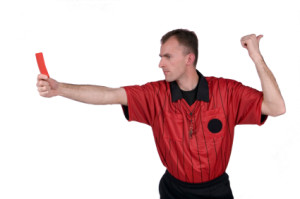
Online marketing is an arms race between advertisers, who look for any means necessary to promote their clients’ websites, and search engines, who try to promote the more relevant and important sites for a given search query. As you might expect, conflicts between these two interests arise on a constant basis.
The search engines, however, run the game, so they can call all of the shots. If they think that a certain black hat SEO tactic goes enough against their interests, they can manipulate their rankings algorithm to bury any site that uses it.
These algorithmic tweaks are known as penalties. There are hundreds of them. Some of them happen automatically, when search engine crawlers index your site and notice something awry. Others are manual, with employees at Google or Bing or other search engines checking out suspicious sites and flagging them for certain activities.
Worse, websites can stumble on them without knowingly doing anything wrong. These are strict liability penalties, with no mens rea required.
Here’s a quick summary of some of the more common penalties used by Google. Other search engines will have similar equivalents, though with different names.
Google Panda Penalizes Shallow Content
Probably the most well known of Google’s automatic penalties, Panda came out in 2011. It penalizes sites that rely on “shallow” or low-quality content. As is par for the course, though, Google has been tight-lipped about what “shallow” content is, providing only a practically unhelpful checklist of questions to consider. However, search engine marketers have analyzed sites hit by the Panda penalty, and determined that “shallow content” is that which is:
- Poorly written, possibly using automated software or gotten through a content mill,
- Very short, and too brief to be of any value to a reader, or
- Duplicative or even copied directly from another page.
Google Penguin Focuses on Bad Backlinks
Backlinks are used by search engines to gauge how reliable a site is. Once online marketers realized this, they saturated the internet with hyperlinks that took an internet user back to their clients’ sites. The Penguin penalty is Google’s response to this black hat move. By noting where links to your site come from, Penguin can make a good guess as to whether those links are legitimate, or if you’re trying to game the system.
The Pirate Penalty Targets Copyright Violators
To back up its tough stance on internet piracy, Google uses its automatic Pirate penalty to demote sites that violate copyrights. While this mainly impacts torrent sites that offer downloads of TV shows and music, any site that gets reported for copyright violation can find themselves on the wrong end of a Pirate penalty. This includes law firm websites that use the wrong picture on their legal blog.
Professional Legal Bloggers Know the Lay of the Land
Professional legal bloggers, like those at Myers Freelance, know all of these penalties, and understand how to avoid them. Contact us today if you are having problems with your legal blog, or if you have noticed that your site’s traffic has taken a dip – you may be the victim of one of these penalties, and aren’t aware of it.